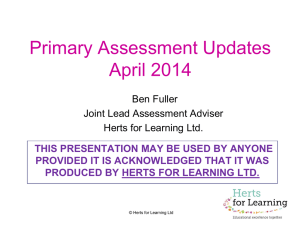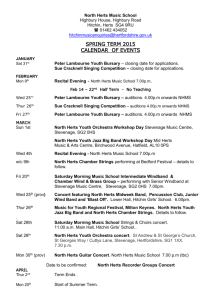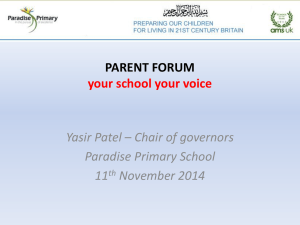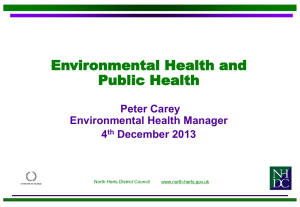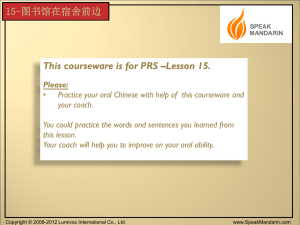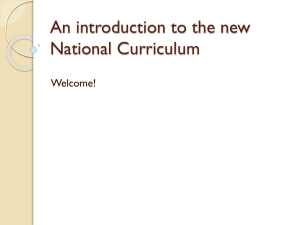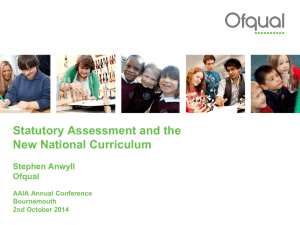- Little Heath Primary School
advertisement
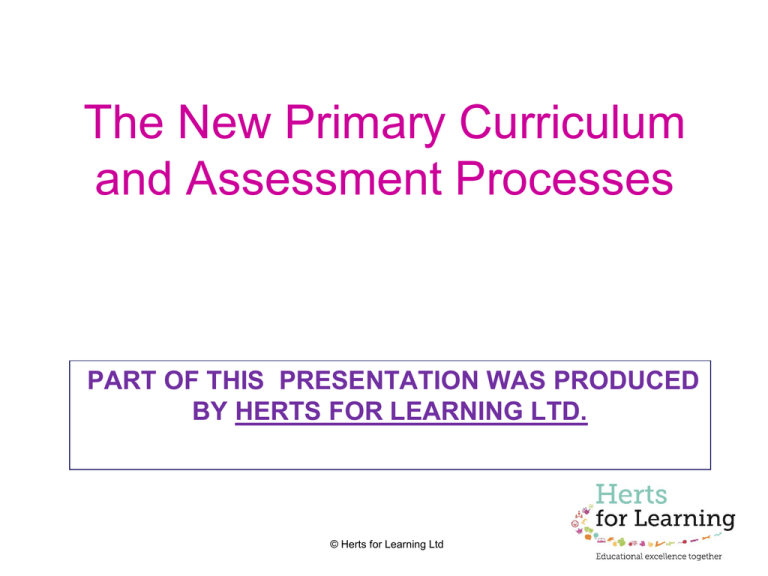
The New Primary Curriculum and Assessment Processes PART OF THIS PRESENTATION WAS PRODUCED BY HERTS FOR LEARNING LTD. © Herts for Learning Ltd New Curriculum 2014 • In September 2014 there were some big changes made to the primary curriculum. The reason for the changes is that the government thinks that they will raise standards. • There have been many changes and we have listed the main ones for you: © Herts for Learning Ltd English • Stronger emphasis on vocabulary development, grammar, punctuation and spelling (for example, the use of commas and apostrophes will be taught earlier in KS1) • Handwriting – not currently assessed under the national curriculum – is expected to be fluent, legible and speedy • Spoken English has a greater emphasis, with children to be taught debating and presenting skills © Herts for Learning Ltd Maths • Five-year-olds will be expected to learn to count up to 100 (compared to 20 under the previous curriculum) and learn number bonds to 20 (previously up to 10) • Simple fractions (1/4 and 1/2) will be taught earlier in KS1, and by the end of primary school, children should be able to convert decimal fractions to simple fractions (e.g. 0.375 = 3/8) • By the age of nine, children will be expected to know times tables up to 12x12 (previously10x10 by the end of primary school) • Calculators will not be introduced until near the end of KS2, to encourage mental arithmetic © Herts for Learning Ltd Science • Strong focus on scientific knowledge and language, rather than understanding the nature and methods of science in abstract terms • Evolution will be taught in primary schools for the first time • Non-core subjects like caring for animals will be replaced by topics like the human circulatory system © Herts for Learning Ltd Design and Technology • Afforded greater importance under the new curriculum, setting children on the path to becoming the designers and engineers of the future • More sophisticated use of design equipment such as electronics and robotics • In KS2, children will learn about how key events and individuals in design and technology have shaped the world © Herts for Learning Ltd ICT • Computing replaces Information and Communication Technology (ICT), with a greater focus on programming rather than on operating programs • From Year 1, children will learn to write and test simple programs, and to organise, store and retrieve data • From seven, they will be taught to understand computer networks, including the internet • Internet safety – currently only taught from 11-16 – will be taught in primary schools. However, Little Heath has been ahead of the game with this. © Herts for Learning Ltd Languages • A modern foreign language or ancient language (Latin or Greek) will be mandatory in KS2. • Children will be expected to master basic grammar and accurate pronunciation and to converse, present, read and write in the language © Herts for Learning Ltd Assessment • As well as changes to the curriculum there have also been changes made to the way we assess the curriculum. © Herts for Learning Ltd Statement from DfE, June 2013 As part of our reforms to the national curriculum, the current system of ‘levels’ used to report children’s attainment and progress will be removed. It will not be replaced. We believe this system is complicated and difficult to understand, especially for parents. It also encourages teachers to focus on a pupil’s current level, rather than consider more broadly what the pupil can actually do. Prescribing a single detailed approach to assessment does not fit with the curriculum freedoms we are giving schools. www.education.gov.uk/schools/teachingandlearning/curriculum/ nationalcurriculum2014/a00225864/assessing-without-levels (June 2013) © Herts for Learning Ltd What do we know so far? • KS1 and KS2 assessment 2015 – still using levels (assessment based on previous Year 2 and Year 6 NC) • Slight changes to KS2 tests (reading and maths papers) • KS1 assessment unchanged • 2016 – new tests for the new curriculum (standardised scores rather than levels) • KS2 writing remains a teacher assessment • KS1 remains as teacher assessment informed by tests (including a new grammar test) © Herts for Learning Ltd 2016 Assessment in more detail • DfE document: www.gov.uk/government/consultations/new-nationalcurriculum-primary-assessment-and-accountability • • • • • • • • Reception baseline assessment from Sept 2016 (or 2015) - schools can choose a commercially provided assessment – or choose not to use one at all! EYFS Profile no longer statutory KS1 still teacher assessment informed by tests (externally set but internally marked) KS2 tests for reading, maths, grammar. Teacher assessment for writing and science. Progress (2023) measured from Reception to KS2 for an all-through primary – not from KS1 (except for a Junior school!) From 2023, if you haven’t administered Reception baseline (2016) you will only have attainment data (2022, progress from either Reception or KS1, whichever is better.) Floor standard – you will be above floor if either pupils make “sufficient progress” (whatever that is) in all 3 of reading, writing and maths or 85% meet the expected attainment standard (based on standardised score) Writing will be a teacher assessment – therefore we need some ‘performance descriptors’ (like levels?) which will be produced for Years 2 and 6. New test specifications – KS1 • www.gov.uk/government/collections/national-curriculumassessments-test-frameworks • KS1 maths – paper 1 (arithmetic); paper 2 (mathematical fluency, problem-solving and reasoning) • KS1 reading – 2 papers, second one harder than first. Teachers use judgement when to withdraw child from test. Majority of marks on comprehension, up to 30% on inference, a few on language for effect • KS1 SPaG – paper 1 (short written task – focus on grammar and punc.); paper 2 (questions on grammar, punc. and vocab.); paper 3 (spelling) © Herts for Learning Ltd New test specifications – KS2 • www.gov.uk/government/collections/national-curriculumassessments-test-frameworks • KS2 maths – paper 1 (arithmetic); papers 2 & 3 (mathematical fluency, problem-solving and reasoning) • KS2 reading – 1 paper. 40-60% on comprehension, 2040% on inference, 10-25% on language for effect, up to 10% on themes and conventions • KS2 SPaG – paper 1 (questions on grammar and punc.); paper 2 (spelling) © Herts for Learning Ltd What about in-between the Key Stage assessment points? • No national system • No levels • Schools have the freedom to develop their own approach to assessing progress However • Ofsted will still need to see robust evidence that pupils are making good progress in learning © Herts for Learning Ltd Reassurance • We have already implemented a system so that we can monitor progress. © Herts for Learning Ltd So why remove levels? Good Practice: Less good practice: • A very broad tool, to be used periodically as a check on standards • Levelling every single piece of work • Detailed level descriptions useful to help teachers consider gaps in pupils’ learning and plan next steps • Labelling children (“I’m a 3c”) • Using level descriptors as children’s targets or as success criteria • Differentiating lessons according to fixed pupil groups, based on their levels © Herts for Learning Ltd What do we believe about good practice assessment? Assessment = an evaluation of what children have learnt at a given point in time Assessment = an ongoing process which is integral to teaching and learning Good quality assessment • • • • • Rich open-ended tasks No ceilings Investigation, problem-solving, choice Group work, dialogue Integral to teaching and learning The principles of good assessment have not changed. © Herts for Learning Ltd 10 Principles of Good Assessment (ARG) Formative Assessment should: be sensitive and constructive foster learners’ motivation promote be part of understanding effective of learning planning goals and criteria develop learners’ capacity for self assessment help learners know how to improve recognise all educational achievement be central to classroom practice focus on how students learn www.aaia.org.uk/afl/assessment-reform-group © Herts for Learning Ltd be a key professional skill for teachers What does this mean? • Age related expectations have been raised for all year groups SO • Children will not reach the new age related expectations overnight and it may appear that their learning has regressed rather than progressed in the initial stages. • Eventually this gap will be closed and it will affect some year groups and subjects more than others. © Herts for Learning Ltd Attainment • When we discuss your child’s attainment with you, you will be informed whether your child is working: • Below age related expectations • Towards age related expectations • Within age related expectations • Above age related expectations © Herts for Learning Ltd Discussion time. © Herts for Learning Ltd
